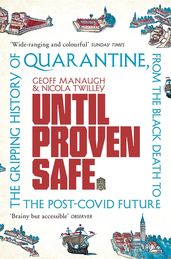Synopsis
'Manaugh and Twilley shed illuminating light on a phenomenon that seems utterly of the present moment.' Financial Times’ Best Books of the Year
'Startlingly timely, authoritatively researched, and electrifyingly written.' Steve Silberman, author of NeuroTribes: The Legacy of Autism and the Future of Neurodiversity
Quarantine has shaped our world, yet it remains both feared and misunderstood. It is our most powerful response to uncertainty, but it operates through an assumption of guilt: in quarantine, we are considered infectious until proven safe. An unusually poetic metaphor for moral and mythic ills, quarantine means waiting to see if something hidden inside of us will be revealed.
Until Proven Safe tracks the history and future of quarantine around the globe, chasing the story of emergency isolation through time and space – from the crumbling lazarettos of the Mediterranean to the hallways of the CDC, to the corporate giants hoping to disrupt the widespread quarantine imposed by Covid-19 before the next pandemic hits through surveillance and algorithmic prediction.
Yet quarantine is more than just a medical tool: Geoff Manaugh and Nicola Twilley drop deep into the Earth to tour a nuclear-waste isolation facility beneath the New Mexican desert, strip down to nothing but protective Tyvek suits to see plants stricken with a disease that threatens the world’s wheat supply, and meet NASA’s Planetary Protection Officer tasked with saving the Earth from extraterrestrial infections.
The result is part travelogue, part intellectual history – a book as compelling as it is definitive, and one that could not be more urgent or timely.
Details
Reviews
Reads like a global safari of humanity’s best-laid plans being never quite enough . . . [Manaugh and Twilley] are well-placed to tell the tale, weaving the spatial, social and scientific facets of medical isolation into an entertaining adventure.
A timely intellectual history of quarantine . . . As Manaugh and Twilley write, quarantine is enforced in cases of potential infection, of possible risk, and therefore admits a degree of uncertainty. One of the striking continuities in their history is how this uncertainty has been exploited to deepen gendered and racialised inequalities.
A compelling case that we must continue to refine the use of quarantine, balancing the needs of public health with those of human rights.
Until Proven Safe is not all doom and gloom, though: there are plenty of QI-style facts in this wide-ranging and colourful survey.
